
The link between regular soda intake and the risk of type 2 diabetes, obesity, and other health conditions is well-known. To counter such risks, the sugar-sweetened version became swapped more regularly for a diet drink.
But, while the Midwest and Northeast continue to debate whether the correct term is "pop" or "soda", you may be wondering, "Is diet soda bad for you?"
On one hand, it seems logical to replace a calorically dense, non-nutritional drink for a sugar and calorie-free version. However, when something seems too good to be true, it usually is.
Unfortunately, diet soda health risks exist and are at least equally troubling as regular soda health risks.
Discover the truth about the debate of diet soda versus regular soda and whether either is worth gulping. Then, stay tuned to learn about healthier alternatives void of risk but with just as much fizzy satisfaction!
Diet Soda vs. Regular Soda
By now most people know the most obvious difference between diet soda versus regular soda. The latter contains some form of sugar like high fructose corn syrup or sucrose. Diet soda, on the other hand, contains a non-nutritive sweetener such as aspartame, saccharin, or sucralose.
Conversely, both versions of soda also include water, sodium, caffeine, and color and flavor additives. Really, lots of chemicals that have rendered controversy at one point or another.
At a glance, diet soda and regular soda do not seem all that different, do they?
Health Effects of Regular Soda
To review, regular soda consumption has been associated with increased risk of the following adverse conditions:
• Obesity
• Type 2 diabetes
• Dental caries
• Metabolic syndrome
• Reduced bone mass and increased risk of fractures
• Heart disease
• Leptin resistance
• Cancer
• Gout
• Dementia
Nearly all of these conditions are caused or very closely related to excess sugar consumption.
Sugary drinks are not satiating, making it easier to over-consume energy. This can lead to weight gain, obesity, and other health risks listed above.
Furthermore, excess sugar in the blood is converted to fat stores in our body. Drinking straight sugar, as is the case with soda, is one of the biggest culprits of sugar surplus.
In addition, regular intake of sugary drinks offers minimal nutrients but a high dose of sugar. Such constant behavior can be disastrous for optimal health or weight loss.
All-in-all, high intake of sugar-sweetened beverages can adversely affect health and the ability to create healthier habits. To avoid the aforementioned chronic conditions, limit sugary drink intake for very special occasions. Or, avoid altogether and choose one of the delicious, healthier options discussed below.
Is Diet Soda Bad For You?
While regular soda poses deleterious health risks that are well-known, diet soda health risks may be less apparent.
The primary difference between regular soda and diet soda is sugar versus a non-nutritive sweetener. That being said, diet soda health risks are partly connected to these artificial sweeteners.
Artificial Sweeteners
Non-nutritive sweeteners, otherwise known as artificial sweeteners, provide a sweet taste. However, they contain no calories, thus, provide no energy to be stored as fat.
While this seems desirable, research shows that consuming artificially sweetened beverages is linked to poor health outcomes.
Two main theories exist to explain this link:
1. The first suggests exposure to palatable substances, like artificial sweeteners, leads to more consumption of other sweet and sugar-filled foods and drinks.
2. Similarly, the second theory proposes artificial sweeteners tend to be upwards of ten times stronger in their sweetness than sugar. Thus, over time, this may alter the brain's reward processing of sweet taste and result in poorer eating behaviors.
One study suggests that regular consumption of artificially sweetened diet soda may be related to the sweet taste reward system. The data provides insight into the link between diet soft drinks and obesity.
Health Risks of Diet Soda
Diet soda intake has been linked to increased abdominal obesity, which increases one's risk for cardiometabolic issues down the road. While this is not saying diet soda causes abdominal obesity, this study notes an alarming relationship between the two.
Additionally, higher consumption of diet soda is correlated with a higher risk of stroke. People who drink diet soda also have a greater incidence of risk:
• Metabolic syndrome
• Type 2 diabetes
• High fasting blood glucose levels
• Larger waist circumference
Finally, a long-term prospective study observed an increase in hip fracture risk in postmenopausal women who drank diet soda and regular soda regularly. It is important to note the study examined soda consumption of all kinds. Researchers found no significant differences in results between any kind/brand or between diet and regular.
With the truth exposed, consider switching diet or regular chemical water for naturally pure tap water. Or, read on and try any of these delicious and nutritious options below.
Healthier Alternatives
When substituting diet soda, try choosing alternatives limited in or void of any artificial sweeteners. (One exception may include Stevia, but more research is needed).
Also look for drinks in their purest, least processed form with all-natural and minimal ingredients and flavoring.
If you enjoyed soda for the bubbly carbonation, consider these alternatives:
• Sparkling or carbonated water
• Sparkling water flavored with a splash of 100 percent fruit juice
• Kombucha (but know what to look for!)
• Maple water
• Fruit and herb infusions
Enjoy the pop on a patio in the summertime? Try these refreshing options:
• Black coffee (creamer optional)
• Unsweetened iced tea
• Warm herbal teas of most varieties
• Coconut water
• Freshly squeezed lemonade
The Bottom Line
The truth about diet soda and whether it is good or bad for you has been revealed.
Consumption of diet soda and regular soda contribute to adverse health conditions. Even though their energy content differs, diet and regular soda can lead to many of the same consequences.
Consider switching to one of the soda or pop alternatives to likewise avoid liquid calories. Not only might this switch decrease the risk of chronic disease, but enhance natural vitality!
References:
Bahramikia, Seifollah, and Razieh Yazdanparast. Effect of Hydroalcoholic Extracts of Nasturtium Officinale Leaves on Lipid Profile in High-Fat Diet Rats. Journal of Ethnopharmacology, vol. 115, no. 1, 2008, pp. 116–121., doi:10.1016/j.jep.2007.09.015.
Leech J. 13 Ways That Sugary Soda Is Bad for Your Health. Healthline. http://www.healthline.com/nutrition/13-ways-sugary-soda-is-bad-for-you. Published February 8, 2019.
Mandl E. Is Diet Soda Good or Bad? Healthline. http://www.healthline.com/nutrition/diet-soda-good-or-bad. Published July 14, 2020.
Nestle, Marion. Soda Politics - Taking on Big Soda (and Winning). Oxford University Press Inc; 2017.
Nettleton, J. A., et al. Diet Soda Intake and Risk of Incident Metabolic Syndrome and Type 2 Diabetes in the Multi-Ethnic Study of Atherosclerosis (MESA). Diabetes Care, vol. 32, no. 4, 2009, pp. 688–694., doi:10.2337/dc08-1799.







